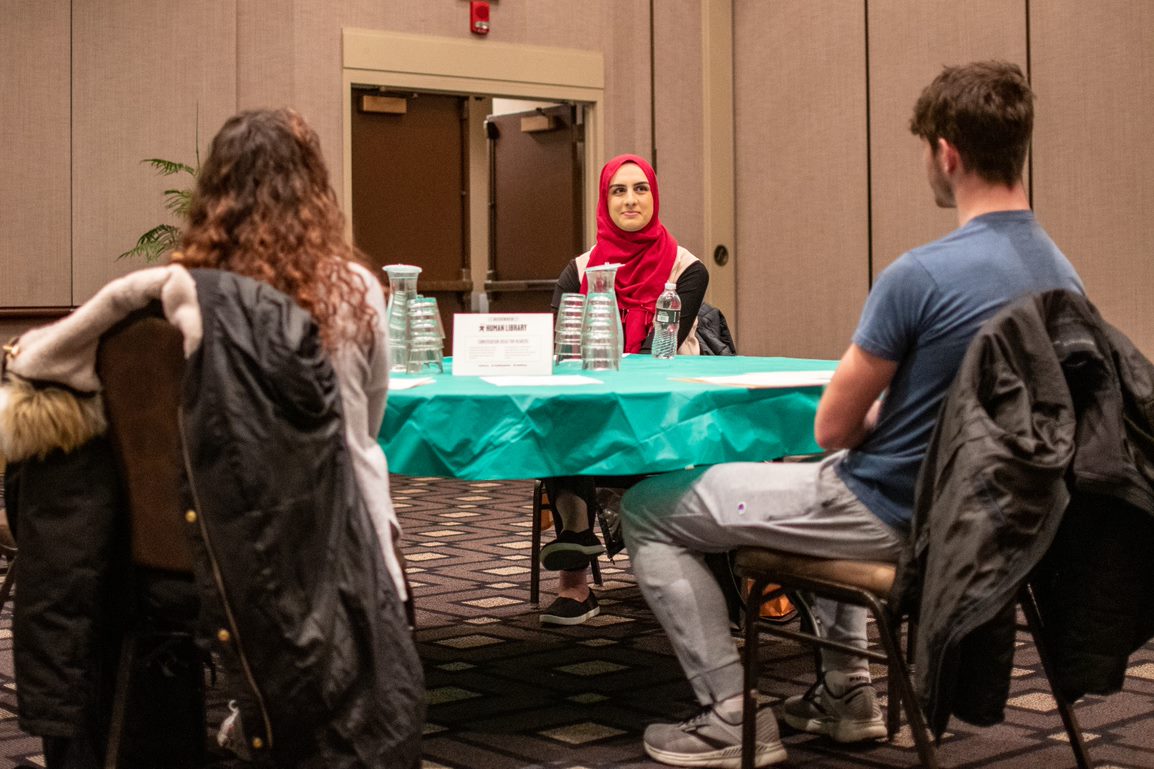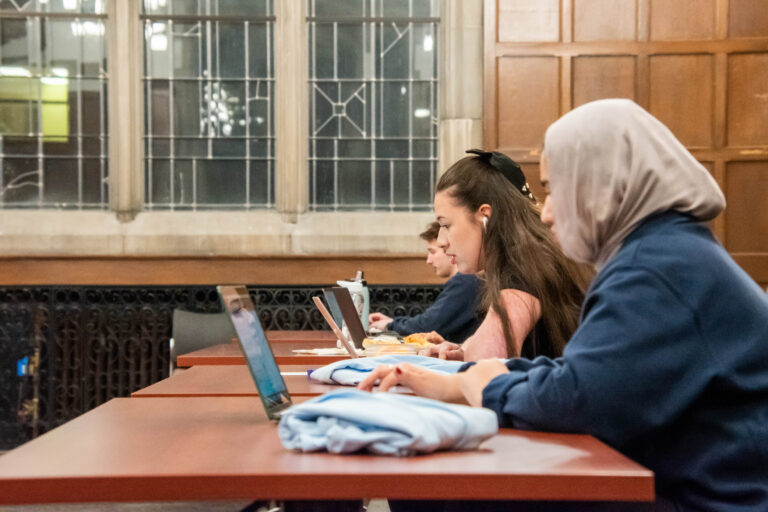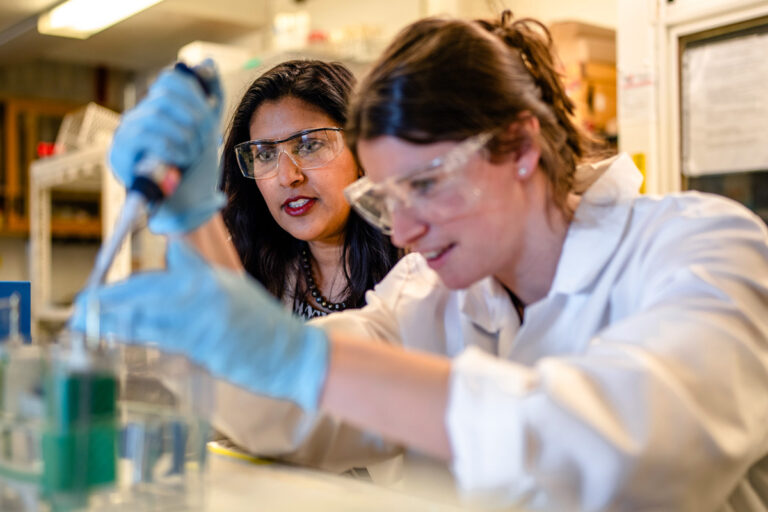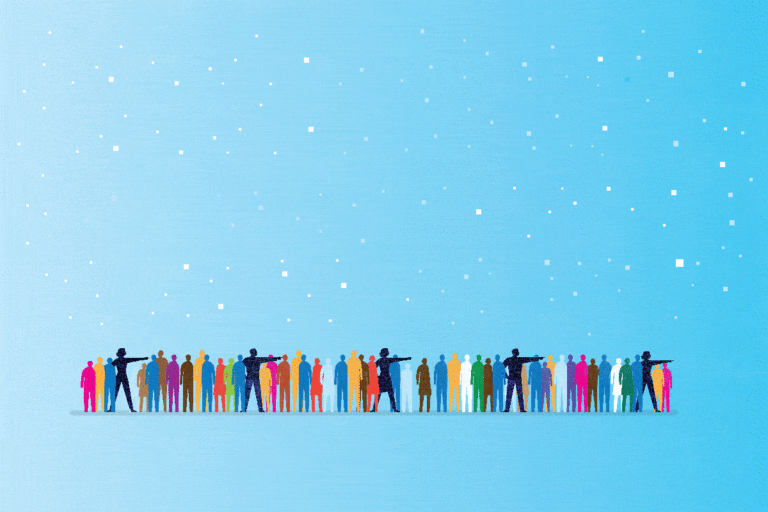Marija Bjegovich-Weidman was scrolling through Facebook posts from a community group in New Berlin, Wisconsin, where she lives, and saw one expressing interest in a new library.
This wasn’t a conventional library; rather, it was a Human Library.
“And I thought, ‘This would be a great experience for students,’” Bjegovich-Weidman says.
The Human Library Organization began in Copenhagen, Denmark, in 2000, as a way for people to challenge their biases toward marginalized groups. In lieu of physical books, the library consists of volunteers who would take appointments with patrons for one-on-one conversations: the human equivalent of “checking out a book.” People curious about the experience of transgender persons or Hassidic Jews, for instance, could reserve time to talk to members of those communities instead of merely reading about them or making assumptions based on hearsay. More than 80 countries have hosted Human Library programs.
Bjegovich-Weidman had been an oncology nurse and nursing leader for 41 years and became a clinical instructor in the College of Nursing in 2018. Shortly after hearing about the Human Library, she began the process of bringing the program to Marquette as part of her Doctor of Nursing Practice (DNP) leadership project. Her ultimate goal is to integrate it into the Culture and Health course, which all nursing students in the program are required to complete.
“Health professionals who hold unchecked biases and stereotypes may have their decision-making compromised and, ultimately, the quality of care they deliver can be negatively impacted,” Bjegovich-Weidman says. “I wanted to create a Human Library pilot program at Marquette for pre-clinical health sciences students so they could become aware of those biases and learn strategies to mitigate them.”
Two groups of people would need to be recruited before the Human Library event could happen, neither of them easy to assemble. The first, “human books”: volunteers representing members of marginalized communities who would not mind sharing their lived experience and answering personal questions. The second, health professions students — future dentists, doctors, therapists and nurses willing to be on the other side of those tough conversations.
Philosophy professor Dr. Stephanie Rivera Berruz helped Bjegovich-Weidman construct the program and secure funding. As co-director of Marquette’s Center for Race, Ethnic and Indigenous Studies (REIS), Berruz has deep experience in cross-disciplinary social justice work like the Human Library.
“The key to successful interdisciplinary work is actually getting people from different fields physically in a room together,” Rivera Berruz says. “That’s what Marija did quite well; she came in and was able to pull people from across campus to make this a successful program.”
Together, Rivera Berruz and Bjegovich-Weidman began convincing people to become part of the project. A Jewish engineering professor. A Korean War veteran. A nurse who is Muslim and wears a hijab. Eleven people from a variety of religious, ethnic, sexual orientation and gender identities volunteered to share their story and be open to questions from students.
These meetings can help dispel what Bjegovich-Weidman calls “single stories,” so-called because they often come from a lone source such as a family member, friend or a media channel. These kinds of secondhand reports often lack the facts or truths of a face-to-face meeting and can lead to harmful stereotypes.
“There is a single story about people living in poverty that they’re lazy and they don’t work hard enough to get out. Sometimes people in Milwaukee have a single story about black fathers being absent from their children. And single stories just aren’t true,” Bjegovich-Weidman says.
Dispelling single stories can be an uncomfortable process, which sometimes acts as a barrier to recruiting participants. Both professors were concerned about low attendance. However, by the time event day came in February, all the available student slots were full.
Katarina Serrano was one such student. As a first-year student in the direct entry Doctor of Physical Therapy program, Serrano is taking the introductory-level courses that underpin every health science curriculum, including the aforementioned “Culture and Health” course.
“That class has a service-learning component and I signed up for the Human Library because I thought it would be a good opportunity to fulfill it,” Serrano says. “My teacher made it seem like it would be helpful in my career.”
Once there, Serrano found herself face-to-face with a person who has HIV, talking about how he copes with the disease in his daily life. She also spoke to someone who had lifelong struggles with depression and anxiety, which resonated on a personal level.
“I struggle with anxiety, so it was really helpful to talk about that,” Serrano says. “We tend to ignore certain things about people that shape their lives. It’s important to understand and learn so we can treat people effectively.”
“Our mission is to educate the next generation of leaders who advance human health and improve community well-being,” says Dr. William Cullinan, dean of the College of Health Sciences. “Our students interact with a wide array of people every day, and efforts like Marija’s are empowering them to become better physicians, therapists and health science professionals who personify cura personalis in all they do.”
Bjegovich-Weidman conducted follow-up evaluations when the event concluded. She had students fill out surveys immediately afterward asking them about their response to the program as well as completing instruments before the event. Students then took evaluations 14 and 28 days after the event to measure implicit bias and social acceptance to determine if the Human Library had a lasting impact.
“The Human Library program was successful in meeting the majority of the target objectives, verified by the instrument and qualitative data reported by the student participants and Human Books,” Bjegovich-Weidman says. “I hope the program will continue.”
“The question is how do we train better practitioners?” Rivera Berruz adds. “We want more culturally aware practitioners when they get out into the field and start caring for people.”
The Human Library already achieved that goal for one of its participants. After going to the Human Library, Serrano decided to volunteer alongside a family member who works with at-risk women.
“She asked me if I wanted to go help her, and prior to the Human Library, I might not have made time for it. After doing the Human Library, I went to help and I felt moved in the same way all over again. The Human Library made me treat people with a lot more sympathy and empathy.”



